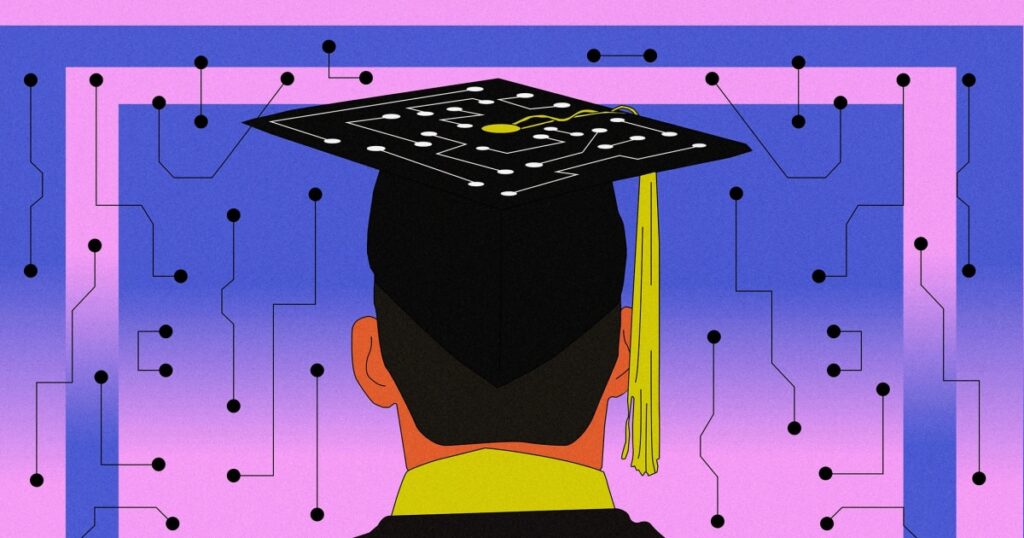As artificial intelligence continues to attract attention and investors, universities from Arizona State University to the University of Texas at Dallas are beginning to market undergraduate-level AI degrees to students.
New graduates are entering a tough tech job market: Whereas a computer science degree was once seen as a golden ticket to a high-paying tech job, increased competition and major cutbacks across the industry now make it harder to land a tech internship or entry-level position.
But AI students and professors hope that more specialized courses of study will contribute to better graduates.
NBC News identified 13 major universities that have begun offering bachelor’s degrees in AI in the past six years.
It’s an open question what will happen to students in these majors, since the first class of AI majors only graduated over the past few years, but early signs suggest that this new degree could be advantageous for younger job seekers.
Carnegie Mellon University was the first in the US to offer a bachelor’s degree in artificial intelligence in 2018, saying at the time that the major would address “the growing demand for AI specialists.” The University of Pennsylvania is planning to offer an AI major this fall, and universities known for STEM research, including Massachusetts Institute of Technology and Purdue University, also now offer bachelor’s degrees in AI.
“This is a pioneering, forward-thinking, interdisciplinary program,” USC Professor Yolanda Gil said in announcing the school’s Artificial Intelligence for Business degree. “It will help business and organizational leaders understand the potential and limitations of AI technologies to better understand the people they serve, predict trends, and improve their decision-making processes.”
Reed Simons, director of the AI program at Carnegie Mellon University, said the school initially had doubts about how interested employers would be in an undergraduate AI major, but he described the response as “very positive.”
“Some of the big tech companies said they were going to hire everyone,” Simons said. “And that was six years ago.”
Simmons noted that most of his students have landed jobs at major tech companies. Students are now also working in other industries, such as healthcare, finance and robotics. While AI majors are not necessarily guaranteed an internship or job at a major tech company like Google or Apple in 2024, Simmons said many of his students have found internships or jobs this summer.
Among them is Mehmet Denis Birlikci, who graduated with a bachelor’s degree in artificial intelligence from Carnegie Mellon University in May and will soon join Amazon as an engineer in its AGI division. He was initially interested in computer science but switched to AI as a sophomore.
“I saw AI as a new computing paradigm that was much more flexible than hard-coding rules,” Birlikci said.
He landed an internship at the Mercedes-AMG Petronas F1 team in 2022 to help train and deploy AI models. Bill Likci believes that the “brand power of CMU AI” helped him land the position.
The program has become popular among students as more students pursue AI degrees. Of the roughly 250 freshmen entering the CS school, 200 said they were “considering” an AI major in a survey, according to Simmons. While he acknowledged that not all students will declare a major, this is a significant increase from the 30 to 35 majors the department projected when it originally launched the program.
Still, getting a job at a big tech company isn’t the primary motivator for students to choose their major, Birlikci said.[Students] Rather than simply getting something done, I’m interested in actually creating something and having an impact.[ting] It’s pure work,” he said.
Birlik also noted that because only a few universities in the United States offer AI majors, it’s hard to tell whether these students’ apparent success in internships and jobs is due to the university’s reputation or the skills they learned in the major.
“There’s a fundamental difference between top schools like the University of Pennsylvania, Massachusetts Institute of Technology or Carnegie Mellon and what it means to graduate from them,” Birlikci said.
Emma Twittmeyer, a junior at the University of Pennsylvania, is one of the school’s first students to major in AI, and she said she has already completed her transfer credits into the new major.
“In the world we live in today, a technical degree is always an asset, and this degree is definitely technical in nature,” Twittmeyer said, adding that he believes majoring in AI will prepare students for careers in a variety of fields.
“We have a lot of students transferring this year,” Twittmeyer said, adding that more younger students will be transferring in the future.
Julie Steele, also in the class of 2026, is majoring in 6-4, Artificial Intelligence and Decision Making, a course that MIT began offering as a major for the first time in 2022.
Steele is doing a software engineering internship at Citadel this summer. Internships at Citadel are among the most coveted among college students. Business Insider recently reported that the company is focusing on recruiting “top talent,” with only 300 selected this year out of tens of thousands of applicants.
Steele said that while his current internship is not directly related to AI, his past experience has been AI-focused: According to his LinkedIn, Steele has worked as a research associate at MIT’s Computer Science and Artificial Intelligence Laboratory and was a data science and AI engineering and research intern at Nasdaq.
Steele said she has heard classmates talk about how it has become harder to find internships, but that students she knows who are majoring in Course 6-4 have had a variety of summer opportunities, including research, software engineering and finance-related internships.
According to Nancy Hsu, founder of Moonhub, an AI-powered tech recruiting platform, a bachelor’s degree in AI may be attractive to employers looking for “good software engineers who understand AI” rather than AI researchers.
“At the end of the day, we don’t have enough AI talent and we need more,” Xu said.

